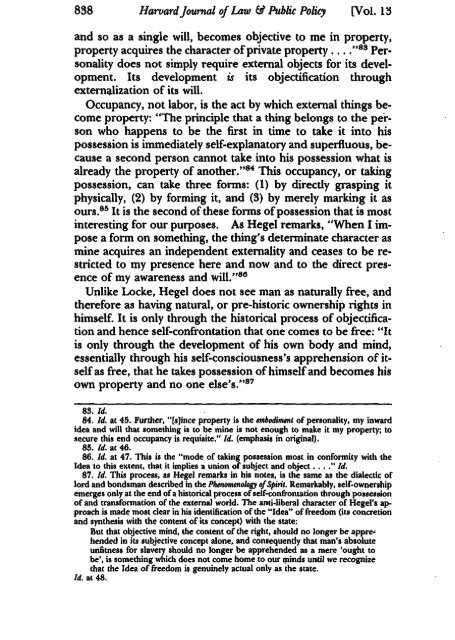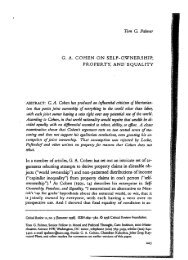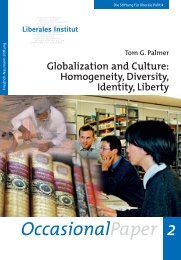Are Patents and Copyrights Morally Justified? - Tom G. Palmer
Are Patents and Copyrights Morally Justified? - Tom G. Palmer
Are Patents and Copyrights Morally Justified? - Tom G. Palmer
Create successful ePaper yourself
Turn your PDF publications into a flip-book with our unique Google optimized e-Paper software.
838 HarvardJournal of Law & Public Policy [Vol. iS<br />
<strong>and</strong> so as a single will, becomes objective to me in property,<br />
property acquires the character ofprivate property. ~ Personality<br />
does not simply require external objects for its development.<br />
Its development is its objectification through<br />
externalization of its will.<br />
Occupancy, not labor, is the act by which external things become<br />
property: “The principle that a thing belongs to the person<br />
who happens to be the first in time to take it into his<br />
possession is immediately self-explanatory <strong>and</strong> superfluous, because<br />
a second person cannot take into his possession what is<br />
already the property of another.” 84 This occupancy, or taking<br />
possession, can take three forms: (1) by directly grasping it<br />
physically, (2) by forming it, <strong>and</strong> (3) by merely marking it as<br />
ours. 85 It is the second of these forms ofpossession that is most<br />
interesting for our purposes. As Hegel remarks, “When I impose<br />
a form on something, the thing’s determinate character as<br />
mine acquires an independent externality <strong>and</strong> ceases to be restricted<br />
to my presence here <strong>and</strong> now <strong>and</strong> to the direct presence<br />
of my awareness <strong>and</strong> will.” 86<br />
Unlike Locke, Hegel does not see man as naturally free, <strong>and</strong><br />
therefore as having natural, or pre-historic ownership rights in<br />
himself. It is only through the historical process ofobjectification<br />
<strong>and</strong> hence self-confrontation that one comes to be free: “It<br />
is only through the development of his own body <strong>and</strong> mind,<br />
essentially through his self-consciousness’s apprehension ofitself<br />
as free, that he takes possession ofhimself<strong>and</strong> becomes his<br />
own property <strong>and</strong> no one else’s.” 87<br />
85. Sd.<br />
84. Sd. at 45. Further, “[s]ince property is the embodiment of personality, my inward<br />
idea <strong>and</strong> will that something is to be mine is not enough to make it my property; to<br />
secure this end occupancy is requisite.” Id. (emphasis in original).<br />
85. Id. at 46.<br />
86. Id. at 47. This is the “mode of taking possession most in conformity with the<br />
Idea to this extent, that it implies aunion of subject <strong>and</strong> object.. . .“ Sd.<br />
87. Id. This process, as Hegel remarks in his notes, is the same as the diaLectic of<br />
lord <strong>and</strong> bondsman described in the Phenomenokgy of Sp&nt. Remarkably, self-ownership<br />
emerges only at theend ofahistorical process ofself-confrontation throughpossession<br />
of<strong>and</strong> transformation ofthe external world. The anti-liberal characterof Hegel’s approachis<br />
made most clear in his identificationof the“Idea” of freedom(its concretion<br />
<strong>and</strong> synthesis with thecontent of its concept) with the state:<br />
But that objective mind, the content of theright, should no longerbe apprehended<br />
in its subjective concept alone, <strong>and</strong> consequently that man’s absolute<br />
unfitness for slavery should no longer be apprehended as a mere ‘ought to<br />
be’, is something which does not come home to ourminds until we recognize<br />
that the Idea offreedom is genuinely actual only as the state.<br />
Id. at 48.











